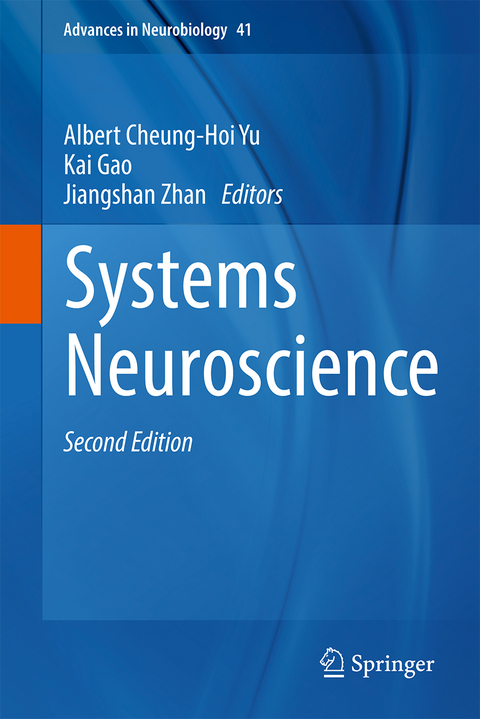
Systems Neuroscience
Springer International Publishing (Verlag)
978-3-031-69187-4 (ISBN)
The new edition of this popular book brings together experts in the field of Systems Neuroscience to present an overview of the area. Topics covered include how different neural circuits analyze sensory information, form perceptions of the external world, make decisions, and execute movements; how nerve cells behave when connected together to form neural networks; the relationship between molecular and cellular approaches to understanding brain structure and function; the study of high-level mental functions; and studying brain pathologies and disease. Among the topics covered in the new edition are artificial intelligence-assisted computational neuroscience for deciphering neural networks, spatial transcriptomics single cell sequencing, and exome/whole genome sequencing for understanding brain disorders in human genetics. The best way to study the brain, the most complex organ in the body composed of 100 billion neurons with trillions of interconnections, is with a systems biology approach.
Albert Cheung-Hoi YU, PhD, JP,
Dr.Yu received his PhD from the University of Saskatchewan, Canada and spent the subsequent years at various institutions, including UCSF, Stanford, HKUST and the Peking University. Undoubtedly, he possesses a broad cross-cultural experience base and is actively involved in both the academic and the business environment for over 40 years. He is now a world-renowned bio-entrepreneur and a scientist with over 20 years of experience in this field. Moreover, he has published over 170 peer-reviewed scientific papers in reputed international journals, in addition to publishing several commentaries in journals like Science and Nature Biotechnology. Apart from his aforementioned designations, Prof. Yu is also the founder and the president of Guangdong-Hong Kong-Macau Greater Bay Area Biotechnology Alliance, on the board of trustees of the Gordan Research Conference, Justice of the Peace and a former member of the board of directors of the Hong Kong Science and Technology Park (HKSTP). With a global network and an expanding base of established contacts in China, Prof. Yu has been a significant facilitator of dialogue regarding the development of the biotech sector in Asia.
Kai Gao, PhD,
Dr. Kai Gao is Assistant Professor at Children's Medical Center, Peking University First Hospital, Beijing, China. He received his PhD from Neuroscience Research Institute, Peking University. He received postdoctoral training at Peking University First Hosptial. He is mainly engaged in the research of pathogenic genes, pathogenesis and intervention strategies of neurodevelopmental disorders in children. He has hosted or is hosting 2 projects of National Natural Science Foundation and 1 project of Beijing Natural Science Foundation. He has published 42 peer-reviewed scientific papers including Brain, Science Bulletin (Beijing), World Journal of Pediatrics, Movement Disorders, Glia, and Epilepsia.
Jiangshan Zhan, PhD,
Dr. Jiangshan Zhan received his B.Sc. in medicine from Peking University, China and Ph.D. in medical research from University of Munich (Ludwig Maximilian University of Munich), Germany with highest degree Summa cum laude. He received postdoctoral training at Neuroscience Research Institute, Peking University, China and Jan and Dan Duncan Neurological Research Institute, Baylor College of Medicine, USA. He is currently review editor and youth editorial member for prestigious journals such as Neural Regeneration Research, Innovation Discovery, Frontiers in Molecular Neuroscience, Neurochemical Research and committee member of the Hong Kong Biotechnology Organization. He has published 3 academic books and 23 journal papers including Cell Genomics, Cell reports, Glia, Neurobiology of Disease, and Immunology.
Section A: Principle and Molecular Foundations.- Determination of neuronal activity and its meaning for the processes of learning and memory.- Emergence of the hippocampus as a vector for goal-directed spatial navigation.- Modelling and controlling system dynamics of the brain: an intersection of machine learning and control theory.- Section B: Cutting-Edge Technologies.- Adeno-associated virus mediated gene delivery across the blood-brain barrier.- Virus-based neural circuit tracing.- Spatial omics: navigating neuroscience research into the new era.- Section C: Application and Clinical Practice.- Alzheimer's disease from modeling to mechanism research.- Inflammatory demyelinating diseases of the central nervous system.- Multi-layer analysis of RNA sequencing data in alzheimer's disease to unravel molecular mysteries.- Opportunities for system neuroscience.
| Erscheinungsdatum | 28.11.2024 |
|---|---|
| Reihe/Serie | Advances in Neurobiology |
| Zusatzinfo | XII, 256 p. 16 illus., 12 illus. in color. |
| Verlagsort | Cham |
| Sprache | englisch |
| Maße | 155 x 235 mm |
| Themenwelt | Informatik ► Weitere Themen ► Bioinformatik |
| Medizin / Pharmazie ► Studium | |
| Naturwissenschaften ► Biologie ► Humanbiologie | |
| Schlagworte | Circuits • Computational Neuroscience • functional genomics • neural diseases • Neural networks • systems biology |
| ISBN-10 | 3-031-69187-3 / 3031691873 |
| ISBN-13 | 978-3-031-69187-4 / 9783031691874 |
| Zustand | Neuware |
| Informationen gemäß Produktsicherheitsverordnung (GPSR) | |
| Haben Sie eine Frage zum Produkt? |
aus dem Bereich


